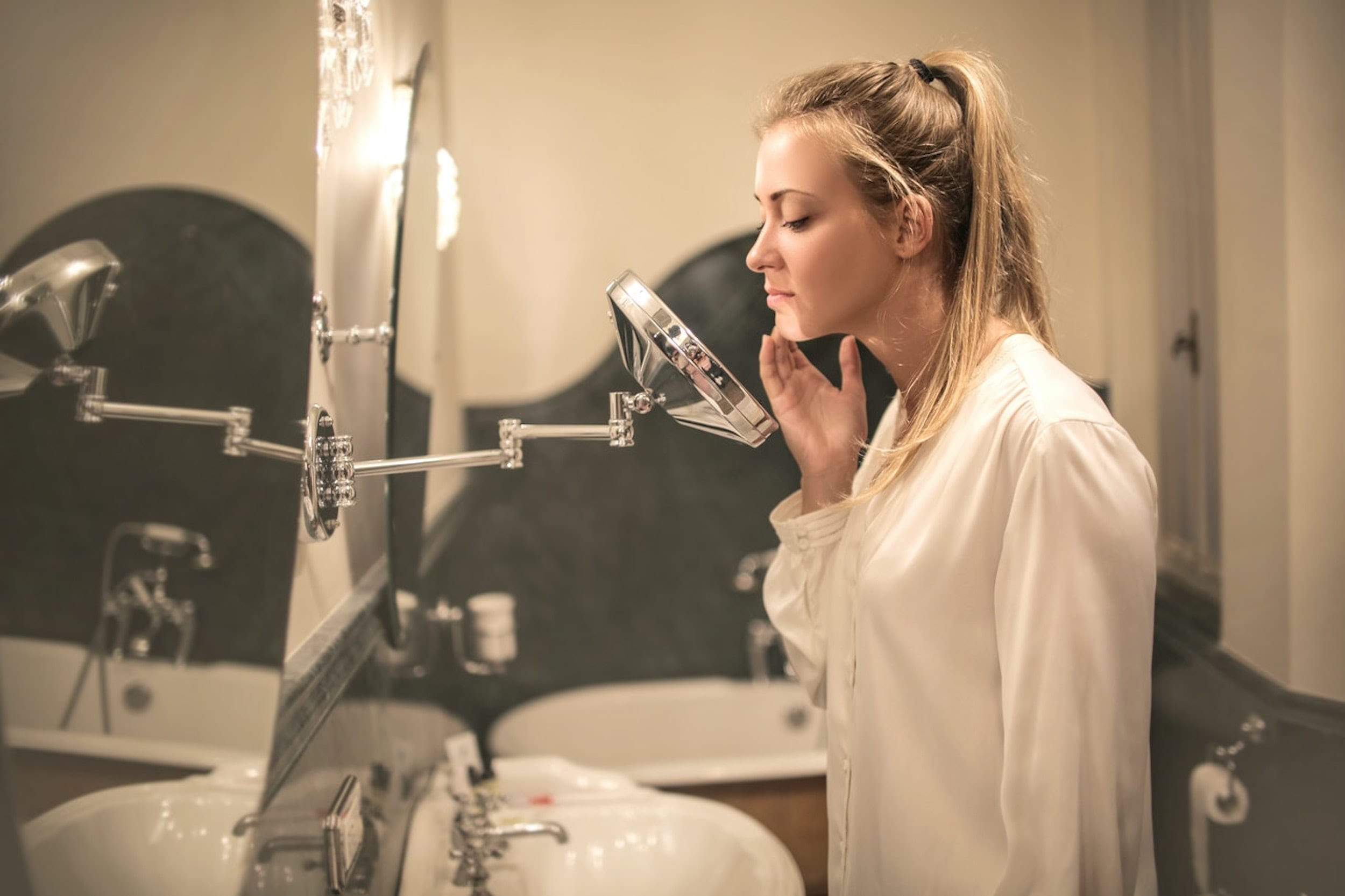Cancer recovery and making a comeback
Cancer Recovery Journey A Personal note from Krista, founder of


Scence Co-Founders
Over 50% of people would describe their skin as sensitive – from stinging or burning when using certain skincare products, to irritation from perfumes or detergents or perhaps skin that is dry, itchy, gets red or breaks out easily.
Whatever your experience, if you have sensitive skin, you’ll know it can be uncomfortable, frustrating and sometimes even just downright embarrassing.
With the better understanding, and maybe a few changes, you’ll be able to tackle sensitive skin, boost your confidence and make worrying about your skin a thing of the past.
Ok, so you know how sensitive skin feels (usually ouch!) but what is actually happening?
First, we need a quick science lesson (because who can remember it from school?!).
Skin has three layers – the epidermis (the waterproof outer layer), the dermis (the middle layer that has sweat glands and hair follicles) and the hypodermis (the deepest layer, containing fat and connective tissue).
Irritated nerve endings in the epidermis are the cause of sensitive skin, resulting in loss of moisture, inflammation, redness and all the annoying symptoms we mentioned earlier. But how does this happen?
The outermost layer of the epidermis is known as the skin barrier. This is made up of skin cells (if you like to sound smart, this is the stratum corneum) and the lipid matrix (fatty acids, ceramides and cholesterols).
Think of it like a brick wall – the skin cells are the bricks and the lipid matrix is the cement.
The skin barrier is essential for keeping out bacteria, germs and environmental factors, but it is also permeable and delicate, so can be damaged.
It is damage to the skin barrier that is one of the most common causes of nerve ending irritation (and therefore sensitive skin). So now you know, top marks to you!
It’s important to mention that some people are genetically predisposed to sensitive skin, but often damage to the skin barrier is the cause.
What in our day to day lives could damage the skin barrier? There are a number of different triggers in both our environment and lifestyle that could do this, including…
If lifestyle or environmental factors could be causing your skin to react, you may want to consider making some changes to help protect the skin barrier, and so retain moisture in the skin and keep irritants out.
Although sensitive skin can occur anywhere on the body, many people find that sensitive skin on the face and hands has the biggest impact on their confidence and self-esteem, as they are often highly visible areas.
If you’re experiencing sensitive skin on your face and hands, it can help to:
Synthetic or chemical ingredients can cause skin irritation for many people, not just those who would describe their skin as sensitive. That’s why you won’t find anything other than natural, plant-derived ingredients in all our products, so we can ensure they’ll be as gentle as possible on every body.
We use only the finest butters and oils in our hand, face and body moisturisers, such as beautiful soothing and softening mango seed butter, and hydrating, restorative borage oil.
We’ve also created our Jojoba Natural range that doesn’t even include any essential oils, so even the most sensitive of souls (and pregnant people) can treat and soothe their skin.
You can take a look at our ingredients in more detail on our Making Scence page.
Perhaps you’re someone who finds their skin reacts when they use deodorant? (we promise you’re not alone!). Modern antiperspirants are packed full of ingredients that can irritate the skin, especially the sensitive underarm area, and even more so if you’re someone who shaves here.
Why not take a look at our natural deodorants, which don’t contain any common irritants such as aluminium or bicarbonate of soda, just lovely gentle ingredients to help you smell fresh as a daisy.
Our approach to skincare also means that we don’t even need to use any preservatives, as our products are all anhydrous (meaning they don’t contain any water in which nasties can grow), so we only need to include the good stuff that does good things for your skin, hurrah!
You may also find it helpful to make some other changes to help prevent and reduce damage to the skin barrier, such as…
There are of course some skin conditions that require a little more help and management, such as eczema and dermatitis. If you’re struggling to get your skin to behave, it’s worth popping along to see your doctor to get it checked out.
Although our products are not medicated, and we can’t (and would never!) make medical claims, we have had lots of wonderful reviews from customers who have told us that they have experienced relief from eczema and dermatitis using our products, which we just thought would be helpful for you to know!
Cancer Recovery Journey A Personal note from Krista, founder of
Self Care this Autumn: the benefits of the return of
HOW TO LOOK AFTER DRY, ITCHY OR ECZEMA SKIN Taking
Sign up to our newsletter to receive exclusive offers and skincare tips.
Copyright ©Scence Skincare 2024 | Website by Solve Web Media | Designed by The Fastnet Agency
| Cookie | Duration | Description |
|---|---|---|
| bcookie | 1 year | LinkedIn sets this cookie from LinkedIn share buttons and ad tags to recognize browser ID. |
| bscookie | 1 year | LinkedIn sets this cookie to store performed actions on the website. |
| LANG | 9 hours | Linkedin set this cookie to set user's preferred language. |
| li_gc | 5 months 27 days | Linkedin set this cookie for storing visitor's consent regarding using cookies for non-essential purposes. |
| lidc | 1 day | LinkedIn sets the lidc cookie to facilitate data center selection. |
| nsid | session | This cookie is set by the provider PayPal to enable the PayPal payment service in the website. |
| TawkConnectionTime | session | Tawk.to, a live chat functionality, sets this cookie. For improved service, this cookie helps remember users so that previous chats can be linked together. |
| tsrce | 3 days | PayPal sets this cookie to enable the PayPal payment service in the website. |
| twk_idm_key | session | Tawk set this cookie to allow the website to recognise the visitor in order to optimize the chat-box functionality. |
| UserMatchHistory | 1 month | LinkedIn sets this cookie for LinkedIn Ads ID syncing. |
| X-AB | 1 day | Cookie associated with embedding content from Snapchat. |
| x-pp-s | session | PayPal sets this cookie to process payments on the site. |
| Cookie | Duration | Description |
|---|---|---|
| __kla_id | 1 year 1 month 4 days | Cookie set to track when someone clicks through a Klaviyo email to a website. |
| _gat | 1 minute | This cookie is installed by Google Universal Analytics to restrain request rate and thus limit the collection of data on high traffic sites. |
| l7_az | 30 minutes | This cookie is necessary for the PayPal login-function on the website. |
| Cookie | Duration | Description |
|---|---|---|
| _ga | 1 year 1 month 4 days | The _ga cookie, installed by Google Analytics, calculates visitor, session and campaign data and also keeps track of site usage for the site's analytics report. The cookie stores information anonymously and assigns a randomly generated number to recognize unique visitors. |
| _ga_* | 1 year 1 month 4 days | Google Analytics sets this cookie to store and count page views. |
| _gid | 1 day | Installed by Google Analytics, _gid cookie stores information on how visitors use a website, while also creating an analytics report of the website's performance. Some of the data that are collected include the number of visitors, their source, and the pages they visit anonymously. |
| AnalyticsSyncHistory | 1 month | Linkedin set this cookie to store information about the time a sync took place with the lms_analytics cookie. |
| CONSENT | 2 years | YouTube sets this cookie via embedded youtube-videos and registers anonymous statistical data. |
| Cookie | Duration | Description |
|---|---|---|
| _fbp | 3 months | This cookie is set by Facebook to display advertisements when either on Facebook or on a digital platform powered by Facebook advertising, after visiting the website. |
| fr | 3 months | Facebook sets this cookie to show relevant advertisements to users by tracking user behaviour across the web, on sites that have Facebook pixel or Facebook social plugin. |
| NID | 6 months | NID cookie, set by Google, is used for advertising purposes; to limit the number of times the user sees an ad, to mute unwanted ads, and to measure the effectiveness of ads. |
| Cookie | Duration | Description |
|---|---|---|
| m | 1 year 1 month 4 days | No description available. |
| wp_woocommerce_session_37126b948e5afd3a014d768c2654215c | 2 days | No description |